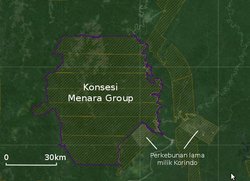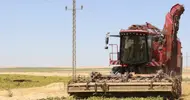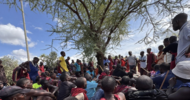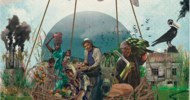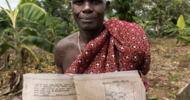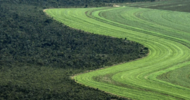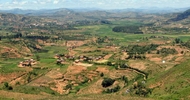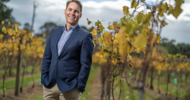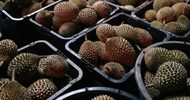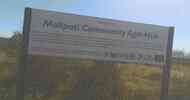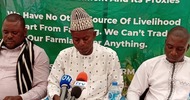Awas MIFEE | 21 May 2014
#savearu sees off Menara Group, time to #savebovendigoel
The story may be over for the Menara Group in Aru, now it’s time to look at Boven Digoel. There another mega-plantation plan is opening the door to the Malaysian timber barons, who are using the pretext of oil palm plantations to get their hands on 400,000 hectares of primary forest.
The people of the Aru Islands have hopefully seen off the Menara Group, which had wanted to claim nearly 500,000 hectares out of the 629,000 hectare archipelago for a giant sugar-cane plantation. After a year of concerted local opposition, bolstered by solidarity from activists from Ambon, on April 10th the forestry minister Zulkifli Hasan stated to the press that he will not sign the final permit the Menara Group needs.
This statement came after the Save Aru campaign highlighted flaws at every step of the process which allowed Menara Group access to the islands: Why was Aru’s land-use plan dramatically changed to allow such a vast plantation? Why were permits given when the proper conditions had not been met? Why was an Environmental Impact Assessment which was approved despite containing neither any description of the company’s plans nor any meaningful assessment of environmental impacts? Responding to public pressure, both the newly-elected Governor of Maluku and the Presidential Work Unit (UKP4) had said they would look into the process.
The activists in Aru know that the Menara Group could still make a comeback, and there are plenty of other companies waiting to take their place, notably the Nusa Ina Group. The islands’ long term future is far from assured. But this is certainly good news.
However, this does not mean that the Menara Group is out of the plantations game for good. Apart from the ill-fated attempt in Aru, it has also been trying to get its hands on large swathes of land in Papua, and seems to have been rather more successful. Menara Group moved into Boven Digoel Regency in Southern Papua around a year before emerging in Aru, and has obtained 400,000 hectares of oil palm concession there, mostly in Jair and Mandobo districts.
There are some similarities between the situation in the Aru Islands and in Boven Digoel. Both are huge areas of land – the Boven Digoel land for example is two-thirds the size of Bali. Both include large areas of primary forest containing valuable timber which has never been logged. Both got their permits from local leaders who are currently in prison, having been found guilty of corruption charges, although neither case was directly related to the Menara Group.
Unfortunately, unlike in Aru, no social movement has emerged in Boven Digoel to address the issue, and monitor any possible irregularities. Very little information has emerged from the ground there. The only direct report came in 2013, when villagers contacted a priest from the area who now works elsewhere, concerned that a company called Menara Group had toured various villages handing out several billion Rupiah as they went. The people didn’t know what the money was for. The concern is that the villagers might have been deceived into signing over their land rights in exchange for this cash.
If no-one is monitoring this company, it could well turn out that the next news only comes after the heavy machinery moves in and villagers realise that their forest has gone. Before this happens, here’s an attempt to piece together some of what we do know about the land, and the companies involved.
Who and what is the Menara Group?
The Menara Group is not known to have operated any plantations before it ventured into Aru and Boven Digoel. However, it appears incredibly ambitious, daring to propose plantations on a scale that no established plantation company has attempted in recent years.
The limit for plantation size in Papua is 40,000 hectares, so Menara Group simply created 10 subisdiaries, all located at different addresses in the Grogol district of Jakarta. This is the first sign of dodginess – many of these addresses do not exist, and in those that do, the occupiers when visited had no knowledge of the Menara Group companies.
This is typical of the Menara Group, which appears to have taken many steps to remain elusive. Its president, Chairul Anhar, is an Indonesian businessman who has interests in Malaysia. Its chairman is more well-known: Da’i Bachtiar was the Indonesian Ambassador to Malaysia from 2008 to 2012, and before that was the chief of the Indonesian police, meaning that he is a figure of some influence. Before this foray into mega-plantations, the group was believed to have interests in consultancy, banking software and e-commerce, but as a private company, its full portfolio of interests is unknown. Neither is it known where the company might find the huge amounts of capital necessary to start up plantations on this scale.
One theory is that the Menara Group’s main intent was to sell on the companies once it had obtained the permits, facilitating Malaysia companies which wished to move into Papua. In 2011, the Menara Group sold two of its subsidiary companies, PT Manunggal Sukses Mandiri and PT Trimegah Karya Utama to the Tadmax corporation of Malaysia, giving Tadmax the opportunity to develop a 80,000 hectare plantation. It is likely that another 160,000 hectares (or four subsidiary companies) have been passed onto Pacific Inter-link, another Malaysian-based company.
Tadmax, clearly after the timber.
Menara Boven Hutan enThe Tadmax deal reveals a lot more information about plans for the land than Menara Group had chosen to make available. Since it is a publicly-listed company in Malaysia, Tadmax has to publish more details of its transactions and accounts.
Notes published at the time of sale included a valuation of the companies. The valuers noted that the forest in the two parcels was “undisturbed forest”, which had never been logged except for some localised shifting cultivation by villagers. They made an estimate of the value of the timber in the concessions: 218,000,000 Ringgit (99 million US$ at the time) . Then they worked out a value of the palm oil concession, based on comparisons with other recent land sales in Indonesia. That came to 69,000,000 Ringgit (31 Million US$). They assumed that these other land deals had no timber component, noting “Our verbal enquiries with Dinas Perhutanan revealed it is norm in Indonesia for the government to only issue ‘Izin Lokasi’ for worked-over forest lands with timber stand covering less than 30% of the land area”.
What that means is that 75% of the value of the concession in Boven Digoel is from timber extraction, and only 25% is from planting oil palm. Moreover, it is unusual for a swathe of primary forest such as this to get a permit for oil palm. What does that tell us about the Menara Group’s motivation for the remaining 320,000 hectares? Is it a coincidence that the Aru Island concession was also mainly never-logged, containing valuable timber?
Tadmax bought the companies for 40 million USD each. In all company statements and press reports concerning their plans, Tadmax explicitly describes its holdings in Papua as ‘timber rights’. Oil palm, which is what they were actually given the permit for, scarcely gets a mention. In its 2012 Annual Report, Tadmax mentions its hope at the time to “proceed to undertake timber extraction and subsequently the setting up of an oil palm nursery (should the Group decide to embark in this sector) commencing in the 4th quarter of 2013 ”. In other words, the company is not even sure if it will bother with planting oil palm.
Tadmax has an oil palm permit, but doesn’t seem to have thought much about oil palm as yet. The thing is, the Indonesian government does not give out unconditional permits to just clear-fell primary forests like that. Logging concessions include conditions for forest management. It expects something back – an oil palm plantation will yield the state returns for decades, whereas Tadmax’s plan is to clearcut the forest within six years, leaving empty land behind after that. The timber permit Tadmax is fixated on (Izin Pemanfaatan Kayu) is intended as an additional permit to allow a company to market the wood it obtains clearing the forest for a plantation.
Tadmax is a company with a background in timber. It was formerly known as Wijaya Baru Global Bhd and owned by one of Sarawak’s timber tycoons Tiong King Sing, before Major Anuar Adam bought a major stake in 2011. Menara Group’s Da’i Bachtiar was also on the board of directors until February 2014.
Integrated Timber Complex Joint Venture
In August 2012, Tadmax entered into a joint venture with several other Malaysian-based companies in Boven Digoel called Tulen Jayamas . To develop oil palm? No, that wasn’t mentioned. The joint venture would be to develop an ‘Integrated Timber Complex’ with “the business of processing timber logs extracted from the Subject Properties into plywood, sawn timber, wood chips and other timber products”
Tadmax only has a 14% share in the joint venture, with four other companies holding the remainder. The largest stake, 50.5%, is held by a company called Bumimas Raya Sdn Bhd. This is described as a ‘dormant’ company, but its registered address and the names of it’s shareholders suggest it is controlled by the Shin Yang Group, one of Sarawak’s biggest timber firms.
25% of the joint venture company is owned by Pacific Inter-link, a manufacturing and trading company based in Malaysia, but owned by the powerful Yemeni Hayal Saeed Anam group. Pacific Inter-link is believed to have bought, or be buying, four of the Menara Group companies. For some time its website has stated that it is in the “advanced stages of acquiring majority stakes (80%) in several Indonesian companies that have been collectively granted concessions and permits for a land bank of 160,000 hectares”
As a privately-owned company, Pacific Inter-link does not have the same obligation to report on acquisitions, so we can’t be sure whether the sale has been finalised. It is not explicitly mentioned in the Joint Venture notice that Pacific Inter-link’s involvement is connected to marketing the timber contained on these 160,000 hectares (which are also primary forest), but it seems very likely.
Pacific Inter-link probably would also want to plant oil palm, as its core business involves trading palm oil and manufacturing many products containing palm oil, but currently owns no plantations. There has been a trend in recent years for commodity traders trading in palm oil to start their own plantations in order to secure their supply chains, and land in Papua is becoming a key target. Other such companies starting plantations include the Noble Group and Tianjin Julong Group.
Shin Yang may also have an interest in palm oil in the area. As well as its timber business, it also owns Sarawak Oil Palms Berhad, with several plantations in Sarawak.
Smaller stakes in the Joint Venture are held by Al Salam Bank Bahrain (eight per cent) and Yakima Dijaya Sdn Bhd (two per cent). The owner of Yakima Dijaya Sdn Bhd, Yee Ming Seng, has reportedly been involved in the logging industry in Papua since the 1990s.
Tadmax looking to sell
In the first few months of 2014, there have been reports in the Malaysian Press that Tadmax, which has been financially struggling for a while, has been looking to sell its interest in the two ex-Menara Group subsidiaries it currently owns, claiming it wants to focus its business on Malaysia. It is optimistic of using the more-favourable exchange rates recently to make a profit on the deal, but questions have to be asked on why it would wish to sell off its main asset. Something not going right in Papua, maybe?
The wheelings-and-dealings of business and finance are always shrouded under layers of intrigue, and we may never get a full picture of exactly who is hoping to unlock the riches of Boven Digoel’s forest, nor what their plans are for the land.
What is clear however, is that far from the corporate towers of Jakarta, Kuala Lumpur or Miri, there is still a tract of primary forest 400,000 hectares wide along the banks of the Digoel River where the greater bird of paradise can still perform its ritual mating dance undisturbed, the southern cassowary roams the forest floor and cuscus and tree kangaroos find their home amongst the branches.
This forest is also home to the Auyu people, the customary landowners of this land, who have lived in harmony with the forest for many centuries. Are they prepared for the coming violent upheaval in their lives if these businessmen get their way? Have they willingly given their informed consent? For oil palm? To logging? In Aru, the Menara Group never made any attempt to present its plans to most of the affected villages. Can we expect it, or Tadmax, or Pacific Inter-link, to be more responsible in Boven Digoel?
This entry was posted in Around West Papua and tagged Agrarian Reform, Al Salam Bank Bahrain, Boven Digoel, Bumimas Raya Sdn Bhd, Chairul Anhar, Da'i Bachtiar, Deforestation, Hayal Saeed Anam group, Land Grabbing, Menara Group, Pacific Inter-link, PT Buana Prima Sakti, PT Energi Samudera Kencana, PT Graha Kencana Mulia, PT Kartika Cipta Pratama, PT Manunggal Sukses Mandiri, PT Megakarya Jaya Raya, PT Pelita Mega Kencana, PT Trimegah Karya Utama, PT Usaha Nabati Terpadu, Save Aru, Shin Yang, Tadmax, Wijaya Baru Global Bhd, Yakima Dijaya Sdn Bhd. Bookmark the permalink. Comments are closed, but you can leave a trackback: Trackback URL.
#savearu sees off Menara Group, time to #savebovendigoel
The story may be over for the Menara Group in Aru, now it’s time to look at Boven Digoel. There another mega-plantation plan is opening the door to the Malaysian timber barons, who are using the pretext of oil palm plantations to get their hands on 400,000 hectares of primary forest.
The people of the Aru Islands have hopefully seen off the Menara Group, which had wanted to claim nearly 500,000 hectares out of the 629,000 hectare archipelago for a giant sugar-cane plantation. After a year of concerted local opposition, bolstered by solidarity from activists from Ambon, on April 10th the forestry minister Zulkifli Hasan stated to the press that he will not sign the final permit the Menara Group needs.
This statement came after the Save Aru campaign highlighted flaws at every step of the process which allowed Menara Group access to the islands: Why was Aru’s land-use plan dramatically changed to allow such a vast plantation? Why were permits given when the proper conditions had not been met? Why was an Environmental Impact Assessment which was approved despite containing neither any description of the company’s plans nor any meaningful assessment of environmental impacts? Responding to public pressure, both the newly-elected Governor of Maluku and the Presidential Work Unit (UKP4) had said they would look into the process.
The activists in Aru know that the Menara Group could still make a comeback, and there are plenty of other companies waiting to take their place, notably the Nusa Ina Group. The islands’ long term future is far from assured. But this is certainly good news.
However, this does not mean that the Menara Group is out of the plantations game for good. Apart from the ill-fated attempt in Aru, it has also been trying to get its hands on large swathes of land in Papua, and seems to have been rather more successful. Menara Group moved into Boven Digoel Regency in Southern Papua around a year before emerging in Aru, and has obtained 400,000 hectares of oil palm concession there, mostly in Jair and Mandobo districts.
There are some similarities between the situation in the Aru Islands and in Boven Digoel. Both are huge areas of land – the Boven Digoel land for example is two-thirds the size of Bali. Both include large areas of primary forest containing valuable timber which has never been logged. Both got their permits from local leaders who are currently in prison, having been found guilty of corruption charges, although neither case was directly related to the Menara Group.
Unfortunately, unlike in Aru, no social movement has emerged in Boven Digoel to address the issue, and monitor any possible irregularities. Very little information has emerged from the ground there. The only direct report came in 2013, when villagers contacted a priest from the area who now works elsewhere, concerned that a company called Menara Group had toured various villages handing out several billion Rupiah as they went. The people didn’t know what the money was for. The concern is that the villagers might have been deceived into signing over their land rights in exchange for this cash.
If no-one is monitoring this company, it could well turn out that the next news only comes after the heavy machinery moves in and villagers realise that their forest has gone. Before this happens, here’s an attempt to piece together some of what we do know about the land, and the companies involved.
Who and what is the Menara Group?
The Menara Group is not known to have operated any plantations before it ventured into Aru and Boven Digoel. However, it appears incredibly ambitious, daring to propose plantations on a scale that no established plantation company has attempted in recent years.
The limit for plantation size in Papua is 40,000 hectares, so Menara Group simply created 10 subisdiaries, all located at different addresses in the Grogol district of Jakarta. This is the first sign of dodginess – many of these addresses do not exist, and in those that do, the occupiers when visited had no knowledge of the Menara Group companies.
This is typical of the Menara Group, which appears to have taken many steps to remain elusive. Its president, Chairul Anhar, is an Indonesian businessman who has interests in Malaysia. Its chairman is more well-known: Da’i Bachtiar was the Indonesian Ambassador to Malaysia from 2008 to 2012, and before that was the chief of the Indonesian police, meaning that he is a figure of some influence. Before this foray into mega-plantations, the group was believed to have interests in consultancy, banking software and e-commerce, but as a private company, its full portfolio of interests is unknown. Neither is it known where the company might find the huge amounts of capital necessary to start up plantations on this scale.
One theory is that the Menara Group’s main intent was to sell on the companies once it had obtained the permits, facilitating Malaysia companies which wished to move into Papua. In 2011, the Menara Group sold two of its subsidiary companies, PT Manunggal Sukses Mandiri and PT Trimegah Karya Utama to the Tadmax corporation of Malaysia, giving Tadmax the opportunity to develop a 80,000 hectare plantation. It is likely that another 160,000 hectares (or four subsidiary companies) have been passed onto Pacific Inter-link, another Malaysian-based company.
Tadmax, clearly after the timber.
Menara Boven Hutan enThe Tadmax deal reveals a lot more information about plans for the land than Menara Group had chosen to make available. Since it is a publicly-listed company in Malaysia, Tadmax has to publish more details of its transactions and accounts.
Notes published at the time of sale included a valuation of the companies. The valuers noted that the forest in the two parcels was “undisturbed forest”, which had never been logged except for some localised shifting cultivation by villagers. They made an estimate of the value of the timber in the concessions: 218,000,000 Ringgit (99 million US$ at the time) . Then they worked out a value of the palm oil concession, based on comparisons with other recent land sales in Indonesia. That came to 69,000,000 Ringgit (31 Million US$). They assumed that these other land deals had no timber component, noting “Our verbal enquiries with Dinas Perhutanan revealed it is norm in Indonesia for the government to only issue ‘Izin Lokasi’ for worked-over forest lands with timber stand covering less than 30% of the land area”.
What that means is that 75% of the value of the concession in Boven Digoel is from timber extraction, and only 25% is from planting oil palm. Moreover, it is unusual for a swathe of primary forest such as this to get a permit for oil palm. What does that tell us about the Menara Group’s motivation for the remaining 320,000 hectares? Is it a coincidence that the Aru Island concession was also mainly never-logged, containing valuable timber?
Tadmax bought the companies for 40 million USD each. In all company statements and press reports concerning their plans, Tadmax explicitly describes its holdings in Papua as ‘timber rights’. Oil palm, which is what they were actually given the permit for, scarcely gets a mention. In its 2012 Annual Report, Tadmax mentions its hope at the time to “proceed to undertake timber extraction and subsequently the setting up of an oil palm nursery (should the Group decide to embark in this sector) commencing in the 4th quarter of 2013 ”. In other words, the company is not even sure if it will bother with planting oil palm.
Tadmax has an oil palm permit, but doesn’t seem to have thought much about oil palm as yet. The thing is, the Indonesian government does not give out unconditional permits to just clear-fell primary forests like that. Logging concessions include conditions for forest management. It expects something back – an oil palm plantation will yield the state returns for decades, whereas Tadmax’s plan is to clearcut the forest within six years, leaving empty land behind after that. The timber permit Tadmax is fixated on (Izin Pemanfaatan Kayu) is intended as an additional permit to allow a company to market the wood it obtains clearing the forest for a plantation.
Tadmax is a company with a background in timber. It was formerly known as Wijaya Baru Global Bhd and owned by one of Sarawak’s timber tycoons Tiong King Sing, before Major Anuar Adam bought a major stake in 2011. Menara Group’s Da’i Bachtiar was also on the board of directors until February 2014.
Integrated Timber Complex Joint Venture
In August 2012, Tadmax entered into a joint venture with several other Malaysian-based companies in Boven Digoel called Tulen Jayamas . To develop oil palm? No, that wasn’t mentioned. The joint venture would be to develop an ‘Integrated Timber Complex’ with “the business of processing timber logs extracted from the Subject Properties into plywood, sawn timber, wood chips and other timber products”
Tadmax only has a 14% share in the joint venture, with four other companies holding the remainder. The largest stake, 50.5%, is held by a company called Bumimas Raya Sdn Bhd. This is described as a ‘dormant’ company, but its registered address and the names of it’s shareholders suggest it is controlled by the Shin Yang Group, one of Sarawak’s biggest timber firms.
25% of the joint venture company is owned by Pacific Inter-link, a manufacturing and trading company based in Malaysia, but owned by the powerful Yemeni Hayal Saeed Anam group. Pacific Inter-link is believed to have bought, or be buying, four of the Menara Group companies. For some time its website has stated that it is in the “advanced stages of acquiring majority stakes (80%) in several Indonesian companies that have been collectively granted concessions and permits for a land bank of 160,000 hectares”
As a privately-owned company, Pacific Inter-link does not have the same obligation to report on acquisitions, so we can’t be sure whether the sale has been finalised. It is not explicitly mentioned in the Joint Venture notice that Pacific Inter-link’s involvement is connected to marketing the timber contained on these 160,000 hectares (which are also primary forest), but it seems very likely.
Pacific Inter-link probably would also want to plant oil palm, as its core business involves trading palm oil and manufacturing many products containing palm oil, but currently owns no plantations. There has been a trend in recent years for commodity traders trading in palm oil to start their own plantations in order to secure their supply chains, and land in Papua is becoming a key target. Other such companies starting plantations include the Noble Group and Tianjin Julong Group.
Shin Yang may also have an interest in palm oil in the area. As well as its timber business, it also owns Sarawak Oil Palms Berhad, with several plantations in Sarawak.
Smaller stakes in the Joint Venture are held by Al Salam Bank Bahrain (eight per cent) and Yakima Dijaya Sdn Bhd (two per cent). The owner of Yakima Dijaya Sdn Bhd, Yee Ming Seng, has reportedly been involved in the logging industry in Papua since the 1990s.
Tadmax looking to sell
In the first few months of 2014, there have been reports in the Malaysian Press that Tadmax, which has been financially struggling for a while, has been looking to sell its interest in the two ex-Menara Group subsidiaries it currently owns, claiming it wants to focus its business on Malaysia. It is optimistic of using the more-favourable exchange rates recently to make a profit on the deal, but questions have to be asked on why it would wish to sell off its main asset. Something not going right in Papua, maybe?
The wheelings-and-dealings of business and finance are always shrouded under layers of intrigue, and we may never get a full picture of exactly who is hoping to unlock the riches of Boven Digoel’s forest, nor what their plans are for the land.
What is clear however, is that far from the corporate towers of Jakarta, Kuala Lumpur or Miri, there is still a tract of primary forest 400,000 hectares wide along the banks of the Digoel River where the greater bird of paradise can still perform its ritual mating dance undisturbed, the southern cassowary roams the forest floor and cuscus and tree kangaroos find their home amongst the branches.
This forest is also home to the Auyu people, the customary landowners of this land, who have lived in harmony with the forest for many centuries. Are they prepared for the coming violent upheaval in their lives if these businessmen get their way? Have they willingly given their informed consent? For oil palm? To logging? In Aru, the Menara Group never made any attempt to present its plans to most of the affected villages. Can we expect it, or Tadmax, or Pacific Inter-link, to be more responsible in Boven Digoel?
This entry was posted in Around West Papua and tagged Agrarian Reform, Al Salam Bank Bahrain, Boven Digoel, Bumimas Raya Sdn Bhd, Chairul Anhar, Da'i Bachtiar, Deforestation, Hayal Saeed Anam group, Land Grabbing, Menara Group, Pacific Inter-link, PT Buana Prima Sakti, PT Energi Samudera Kencana, PT Graha Kencana Mulia, PT Kartika Cipta Pratama, PT Manunggal Sukses Mandiri, PT Megakarya Jaya Raya, PT Pelita Mega Kencana, PT Trimegah Karya Utama, PT Usaha Nabati Terpadu, Save Aru, Shin Yang, Tadmax, Wijaya Baru Global Bhd, Yakima Dijaya Sdn Bhd. Bookmark the permalink. Comments are closed, but you can leave a trackback: Trackback URL.


